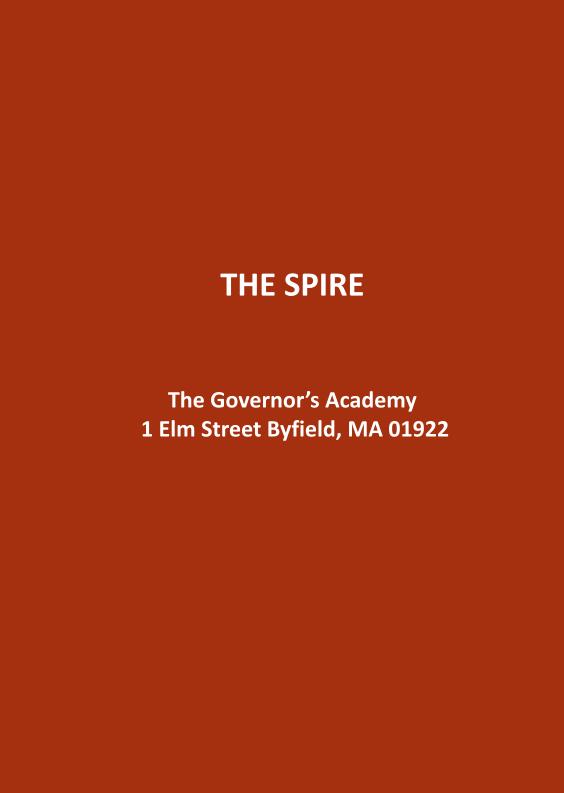






The Spire is The Governor’s Academy student literary magazine. Students submit their short stories and poetry to student editors who then decide which entries will be published. The Spire has been a voice for student literary creativity since 1966.
Winners of the Murphy Mercer Short Story and Poetry Contest are also included in The Spire. The A. MacDonald Murphy Short Story and Thomas McClary Mercer Poetry Contest was created more than two decades ago to honor the work of the two English masters, whose combined service to the Academy totaled more than 65 years, and to encourage students’ pursuit of creative writing. Students submit entries which are read and voted upon by the English Department. First prize winners in
each category receive a book prize and their works appear in the annual publications of The Spire each spring.
Student Editors:
Tianyi Shen ‘23
Tilley Winokur ‘23
Victoria Liu ‘24
Fiona Xu ‘24
Elina Zhang ‘24
English Department
Faculty Advisor:

Tom Robertson P’16, ‘19, ‘24
Cover Image: A House in Kashgar
Don Xing ‘24
Special thanks to faculty and staff in the departments of English, Arts, and Communications
Perched delicately on a branch, the chameleon may easily evade your gaze. But don’t blame yourself for missing this elusive creature–– it’s likely that the chameleon prefers to remain hidden. Witharemarkableabilitytochangethe color and pattern of its skin, this creature is a true marvel of nature. In fact, chameleons serve as the quintessential example of animal camouflage in popular culture, from children's books to blockbuster movies like Rango. Yet the truth about the chameleon's color-changing abilities is far more complex and fascinating than whatweoftenassume.
Specialized cells, known as chromatophores, allow chameleons to unveil a rainbow of colors ranging from the purest black to the brightest red. However, this display is not always for the sake of blending in. In
fact, a chameleon’s choiceofcolorand patternisoftenareflectionofitsmood.
For instance, when a chameleon is surrounded by familiar individuals, it displays bold and eye-catching hues. Unique colors also serve to assert dominance and attract mates. However, when threatened by predators or unfamiliar chameleons, they rapidlychangetheirappearanceto a muted and subdued tone, melting seamlesslyintotheirsurroundings.
I remember trying out every piece of clothing, floral dresses and simple sweatpants, in what was then my new home. Clothes lined the wooden tiles and a half-emptied suitcase cracked open in its midst. An hour had already passed. I plopped onto the cushioned floor still pondering. I only wanted to fit in. I didn’t want Tom or Sally to find me weird and I didn’t want Betty to avoid me. So would a dress be too striking? And would sweatpants betoocasual?I texted Betty just to confirm the pairof
navy blue wide jeans and the cream college sweatshirt that laid on my undone bed. It’s just an outfit, I told myself.
The first day of school is always nerve-wracking. I got up early just to change into my pre-picked outfit. I headed out only after I double-checked my backpack,myhair, and my socks, just in case they didn't match. On the path there, I wished everyone was wearing the same thing, no matter how odd of a sight that would be. Thankfully, my chameleon scales blended perfectly into my surroundings. That meant that neither the bullies nor the popular kids could hurt me; that neither could find me. A puff of relief escaped my mouth, but myeyesraisedstillwithhighalert.
As I look at my many first impressions, I begin to understand the chameleon more clearly. Beneath its malleable exterior,thechameleonhasa surprisingly rigid complexiondesigned for defense. It has a bony triceratops-like shield at the backofits head and, along its spine and underbelly, a series of sharp spikes. While the chameleon is not built to fight, its pseudo-armored appearance
ward off attacks and helpsittosurvive in its environment. Moreover, with their deliberate, slow movements and inconspicuous colors, chameleons maybecomeinvisibletothenakedeye, making it difficult for predators to identifyandattackthem.
I hadn't noticed how developedmycamouflagehadbecome. A week from the start of summer break, I was attending a student exploration program inIceland.Istood by the airport gate waiting for the rest to arrive because, as always, I had arrived early, too afraid to be left behind. I leaned over the metal railing and waited patiently for someone, anyone,whowasn’tAmerican.
Soon I figured that I was the only one, the only non-American, or rather Asian, in the group. They spoke a familiar language I still could not understand. I had heard of Miami but unlike the rest, I had never been. Ihad only explored Massachusetts, for the sole purpose of school. So my head kept low, maybe if I didn’t move they wouldn’t notice me. Nonetheless, I wasn’t as inconspicuous as the chameleon. “And you? Miffy, right? Whereareyoufrom?”Tracingmyeyes
across the jagged edges of the table, I mumbled, “I’m from Mass.” They didn’t expect it and neither did I, but the one simple “fact” had loosenedthe straining grip of fear. For days, I performed a sort of mimicry, blending so perfectly into the crowd that you could barely make out the chameleon perchedonthebranch.
The chameleon is known for its color-changing ability, but there’s another aspect of its anatomy that’s equally impressive: its unique, long tail. This tail is a thing of beauty, curlingarounditselfinaperfectgolden ratio,mirroringaseashell.Whoknewa curl ofatailcouldbesopleasingtothe eye? Still, the chameleon’s tail is’'t just for aesthetics. As a clumsy creature, the chameleon’s limbs are adapted to ensure stability. They have specially adapted toes, curved to the branches in such an extreme manner that they are unfit to walk across flat surfaces. They also use a fifth "leg," their mobile tails, to grasp onto branches for precaution.Ultimatelythe chameleon's body has been shaped by unique challenges induced by its anxieties.
Anotherlookattheanimaland you surely would catch its large doe eyes. Scientists are fascinatedbythem, or more specifically their ability to move independentlyfromeachother.It may seem a bit creepy— one eye can be looking one way while the other is monitoring something totally different— but it comes in handy. In combination with their binocular vision, which allows them 360degrees of vision, chameleons can track and guard simultaneously, all while remaining still. With these opportunistic adaptations, Some scientists joke that they all have social anxiety.
The American seized me. My odd fusion of accents was replaced by dragged yas and peppy for reals.What was usually thoughtless became a constant effort to sustain. While everyone complimented the salmon, I stared at the dish with frustration. There’s obviously an Linthewordbut I can’t pronounce it or they’ll know. Each instance I spoke of the SA-mon, my eyes skimmed by the faces sat across the stretched counter to make sure no one bore a questioning look. I was safe. Every movement, every
word, and every look was dictated by thefearthatwasstranglingme.
In a space where predatorsare absent, the nanocrystals in a chameleon’s shift to reveal anewcoat. Imagine the brilliant reds of a maple leaf, the deep, dark hues of a summer sunset, and the bright yellow of a sunflower bloom. The chameleon paints the dull brown canvas of their skin. These canvases are mounted in galleries for fellow chameleons to observe. The colors shimmer across
their scales like a kaleidoscope, constantly shifting. Finally, the chameleonsarefreefromtheirfear.
Suffocating, I tore off the strangling grip to reveal the complex and bright patterns of my skin. Rather than the predators I imagined, my fellow chameleons embraced me and my colors. Now, you can easily spot the chameleon perched ruby red and glimmeringgreen.
Suchislife.

 (w)Holesome Tenley Lefebvre ‘24
(w)Holesome Tenley Lefebvre ‘24
1.
Grandma once said “As a family, we are complete idiots in music.”
In Chinese, we use the four-character idiom 五音不全, or if translateddirectly,“five-sound-notcomplete,” to describesomeonewhois tone deaf. The“fivesound”alludesnot to do-re-mi-fa-so of western music scale, but to the five sound-making parts of the body— thelip,teeth,nose, throat, and tongue. To be tone deaf is to be incomplete in a part of the body, an apocalypse that prevailed amongst allofus,noneofusfreetoescape.
2.
What does it mean when you show up to the public library every morning at 8 am sharp? What does it mean when your entire belongings consist of one polka-dotted suitcase, two Tj-Maxx plastic bags, and one
time-worn guitar? What does it mean when you charge your 10-dollar-instant-pot boiled with 99-cent-a-bag-ramen besides other people’s Macbook Airs and iPadPros? What does it mean when your 99-cent-a-bag-ramen spills onto the floor and everyone just looks? What does it mean when you pace back and forth, dragging your left crippled foot with uneven, uneasy steps to clean up, to make people stop looking, to let them recede behind their fancy MacbooksandiPadsonceagain?
3.
I squint. A pair of hands lay sunburnt and limp beside her pale and marked body. A palm reader once gasped at all its carved-in paths, its rough-patch calluses the drawing pins of a close-up city map. Not good, the palm reader shook herhead,asiftorid the stains on her eyes from something
dirty imbued in her palms, a life too busy, too many worries.
4.
Wanna hear some tunes ladies?
It has been a few years since I’ve heard John Lennon, and a couple more since I’ve stopped my footsteps in the middle of a bustling street. The man’s thick, creased, chapped hands caressed the aged wood, all its once-pointed splinters pressed and softened with time. On what is left of his pants, the cloth covering his thighs was greased and darkened like shadows from the guitar's lengthy tenure. His left hand tapped lightly on its wooden case, as if to an ethereal rhythmunbeknownsttomen.
Tremors,maybe.Idivertedmyeyes. Wenoddedyes,andhebegan.
“Well, they shake their heads and they look at me, as if I’ve lost my mind I tell them there’s no hurry, I’m just sitting here doing time“
5.
What does it mean when you call asecond-handguitarstore,withall your 110 dollars, time and time after again? What does it mean when they tell you to dial a different number,
hold, stay on the line, shut you down and you say again and again: I’m so sorry I called earlier, but I would like to purchase the second-hand Yamaha C40 that’s in your Braintree store on 255 Grossman Avenue.
6. A body of a woman marked by twenty-five years of unhappy marriage, of thirty years of raisingtwo girls and the girls of the two girls, of nights dicing pork, boiling bok-choy, and pressing halves of dumpling skins into folds and creases. A body that gulped down every dinner and shoved spoonfuls and spoonfuls of hot slimy porridge down my inflamed throat because Time waits for nobody! She yelped, her voice made hoarse by the unknownwho,where,what.
7.
What does it mean when finally somebody picks up and tells you that the guitar is in stock and you can purchase it now, on the phone, but it would cost 120 dollars because of taxes, shipping? And your pale, aged, half-scared face twists into a deeper sorrow,andyourvoicequivers, Is there
any way I could get that 10 dollars to you at a different time? I just don’t have it right now, I can get it to you…could you just, just let me purchase…oh…okay…alright then…there’s no way? I…I just really…
8.
Mama said don’t look, but her frame wastoolittletocovermyview.I glanced past the shades of dark green and blue underneath her eyes and peered into the white room. White walls, white floors, white sheets,white duvet covers, white pillows, white gowns, white IV racks, white, white, white, and there lay my grandmother, the white mesh covering the just-sewed-up holes of her scalp: her armscradlingthemselves;herfacepale as ifchallengingthewhitepillowcases beneath her; her foot bent at unnatural angles, earth’s weight pulling on her toes. She lay on her side, the folded duvet burdened with her body’s weight.
I forced my eyes away from her fragile, naked body, but it was too late. The needle had already pierced through thin ice. Her once limp, lifeless body jerked from the sudden
knocking of life. Her armstwistedinto themselves, bones pushing and pulling the muscles that had slept. Her legs squirmed like two white worms in the quagmire of white fabric. My breath heaved as her lungs limped with every jot. Clear fluid pulsated out of her back. I saw life forced into her. I saw nothingleftbutpain.
9.
Beyond plain sight, there was abody.
10.
I am the absent passenger on the train called the tangling and detangling of living and dying. I am the observer, watching the white lines on the monitor screen simplify a woman’s life into mere rising and falling. A pair of ears to receive the cadence of staccato beeping from the Vitals Monitor which showed nothing thatisvitalabouther.
I can’t feel her pulse… I can’t feel her pulse. Her warmth is slipping away between my fingers, the rhythm of her heartbeat faltering like my tone-deaf singing. Notes off key; heart offbeat. Her life spins outoftuneandI
can only look on inafrenzy.BecauseI am a body missing its sound-making parts,twohandswithoutabatontopull her tone-deaf body out of the final cadenza of her life’s song called the tangling and detangling of living and dying. Instead, I hear this train derailing, the clanking and clacking of metal and the meager pleading of the living, the unpurchased guitar strings breaking.
I look down at my hands and see herhandsinstead.Apalmwithcity maps that I have yet to read. I see the hands of that homeless man with that old guitar, whose tremors engulfed all histenfingers,disease-conquering.
Coda.
Growing up, we hadnocoffee table in the summer seasons. Right around the time when the feverish white dream of pear flowers shatters, an army of ripped strands of napa cabbage would seize our wooden, second-hand coffee table. The pale, green pieces lay leisurely, leaving small moistfiguresonthepapertowels underneath. In a week, they would
shrivel and gray into small clustered folds, as if beaten-down flower petals from a night of summer’s tempest. Before long, this batch of fallen soldiers would be collected and replaced. While fresh cabbage was stripped toitselementsthenlaid,dried, and crumpled, the eldest batch would then be “fixed” by my grandmother’s magical hands. First, the pressing––her thick, calloused palms usher the remaining moisture out of thedried-up leaves. Then, on the chosen afternoon, grandma would work her weathered fingers and sun-burnt knucklesintothe crevices of these shriveled leaves, forcing the dark and light soy sauces, fried chili oil glaze, sesame seeds, julienned ginger, and too much garlic into the folds. Fold after fold, batch after batch. Repeatingthesamemotion of pushing and pressing as she had worked her calloused hands into my back, smoothing out all the knots and itches as we drifted off to sleep, night afternight.
Timewaits.
 Marooned
Miffy Wang ‘24
Marooned
Miffy Wang ‘24
Noun
Gradualdeclineintodisorder.
…
It startswithanegg.Well,five eggs. Five eggs thataresupposedtobe six, seven dollars and thirty-seven cents in change, and one extremely convenientlyplacedsewerdrain.Anda sidewalk. More accurately, a crack in the sidewalk. Well, two cracks to be specific, though Sophie would argue thatitisn'tveryimportant(eventhough Aaron would argue thatitis),butthat's really neither herenorthere.Okay,you knowwhat?Itstartswithadog.
…
The most complicated day of Aaron O’Reilly’s life starts at exactly 6:07 in the morning in twenty-seven degree weather, under the comforter that used to be his cousin’s aunt’s brother-in-law’s, with exactly two things out of place. Well, if you want
togettechnical, three,butthat’snotthe point.
One: he is wearing his socks. This should not be happening, seeing as Aaron cannot fallasleepifsocksare on his feet, as learned the hard wayon the Thursday before the twenty-seventh of February on the second to last leap year ofhislifetime, but that is a story for another time. More concerning than the Thursday before the twenty-seventh of February on the second to last leap year of his lifetime is the fact that hedoesn'tquite remember putting on socks the night before when he got into bed. Nowthat he thinks of it, he doesn't quite remember falling asleep the night beforeatall.
The second thing thatisoutof place is the egg. Well, eggs plural, to be specific, but it’s really just the one egg at the moment. And, well, technically, the third thing has to do
with the second thing, and the third thingisthedog.
Larry the Lord of theLobsters the Third, who is, in fact, the first in his line contrary to popular belief, was the closest thing toacatAaron’sfather could find on the Saturday before Christmas six years ago. (Unimportant but very related: apparently, it is very hard to hide a live animal for more than twelve hours from two of the nosiest sort of homo sapiens, which is to say, children that are just young enough to know that shoelaces should be tied, but not how to tie them, but that’sneitherherenorthere.)
So yes, Larry the Lord of the Lobsters the Third the dogisabigpart of the most complicated day of Aaron O’Reilly’s nine-year-old life, because the not-quite-a-cat that is actually (rather unfortunately) a dog, who just coincidentally also has a nose thatgets into the majority of things it doesn't belong in, has followed his nose and dragged Aaron right along with him. And unfortunately (but rather conveniently), his nose is a problem that was discovered very early on in the life of the
unfortunately-not-a-cat-but-the-next -best-thing.
For example, the day before the last Tuesday of November two years ago (which just happened to be Aaron’s seventh birthday), when Larry the Lord of the Lobsters the Third’s nose was the reason the cake was cupcakes, the green frosting was purple, and the rainbow sprinkleswere sunflower shaped. But that’s neither herenorthere.
But the egg. Yes, the eggs plural,becausethoseareimportanttoo.
So to the point: Aaron should have, in fact, gone through all the inconvenient trouble of maybe, just possibly, reading the chapter that detailed what to do when your dog (that is unfortunately not quite a cat) gets into more trouble than you do of The Handbook to Man’s Best Friend that conveniently seemed to also come in the box that Larry the Lord of the Lobsters the Third leapt out of about forty-seven and two-thirds minutes beforehewasactuallysupposedto.
Some things to note at that point in Aaron’s life: inconveniently (and totally related), Aaron could not tieashoelace.Alsoinconveniently(but
totally unrelated), he also could not read.
Aaron peeks over the covers and wiggles his toes. Yes, those are definitely socks, and those are also definitely his feet, which somehow is more of a cause for concern than if he hadn’tevenseenanyfeetatall.
This is when he notices the egg.
Well, eggs, to be specific. Six in total, and five whole and undamaged, but therein lies the problem.
Aaron shakes his head, because thisisn’tright.Hecountsthem again, and furrows his brows. There are eggs on his bed,which(contraryto popular belief)isnottheissue,because the issue is actually that only five of themarestillthere.
So in other words: this is bad. This is a disaster in progress, because thereareonlyfiveeggs;becauseoneof them is half gone and leaking as though crying tears of mourning for Aaron himself. No, this is bad bad. Mega bad; disaster of the last Tuesday of 1997 bad, which is to say, category five disaster bad. An asteroid could make impact with Earth two and
seven-tenths miles and fourteen feet away, and it would not compare to the disaster of waking up to five eggs instead of six, which is ratherthemost vital part of today. This is a Larry the Lord of the Lobsters the Third kind of bad,whichistosay, catastrophic.
“Mom is gonna kill me!” Aaronshrieks.
(Yes, Larry the Lord of the LobsterstheThirddisaster indeed.)
He kicks off the covers and tumbles to the floor, cradling the salvageable batch of five insteadofsix eggs in his arms, as Larry the lord of the Lobsters the Third (who is definitely not a cat) licks his face with all the supportive ignorance of a dog who has just caused the apocalypse by eatingthesixthegg.
“Oh, Larry the Lord of the Lobsters the Third, what have you done?” Aaron says in horror, the remnants of this atrocity drip from the decidedly-not-a-cat’s mouth, and Aaron wishes he could drip down into the rug just the same as the yolk on Larry the Lord of the Lobsters the Third’schinstainsthecarpet.
Aaron puts his head in his hands and mourns the loss of his egg.
The half that Larry the Lord of the Lobster the Third has spared stares up at him with a gaping hole that isn’t quite big enough to hold the enormity of his guilt at this situation, butretains thesentimentallthesame.
This is very much bad indeed. He drops his hands in despair. What is hesupposedtodonow?
“Oh, Larry the Lord of the Lobsters the Third, I told youto watch the eggs, not eat them!” he groans. Larry the Lord of the Lobsters the Third wags his tail in excitement. Aaronshakeshisheadingrief,because he’sreally,trulyscrewedupthistime.
Larry the Lord of theLobsters the Third nudges Aaron with his uniquely troublesome nose, and Aaron reluctantly straightens up. Larry the Lord of the Lobsters the Thirdisright; there is only one thing left to do now. Unfortunately.
Aaronsetshisjaw;heneedsto consult his twin for this. Sophie O’Reilly willnodoubthavetheperfect solutiontothiscalamitousproblem.
Aaron looks to the twin bed across the room from his own and
gulps, because this is just the first adversity to endure in what is to be a long, herculean journey. They always say the first step is the hardest, but Aaron believes that this certain task mightjustbeimpossible.
Nobody wakes Sophie O’Reilly, otherwise they risk a repeat of the seventh Sunday of their sixth year alive, and that is something no one wantstorepeat.Noteventhedog.
So when consumed by memories of the seventh Sunday of their sixth year alive, Aaron hesitates; but he looks down at his five-instead-of-six carton of eggs, and decides the onus misfortune of possibly facing the histrionic tendencies of his sister is far outweighed by the five eggs in his hands. In other words: this must be done.
And anyways, as the saying goes: with five instead of six eggs comes a great responsibility, or somethinglikethat.
Saturday Night
Victoria Liu ‘24

2023 First Place
Albert Niu ‘23
Comeonin, Hesayswithapolitegesture,professionalsmile,powerfulhandshake textbooktechniquestotune myperformancelevel,buthedoesn’tneedto mystringsarelooseenough,I’malreadydrifting Away.
Dimasthelightsare,theystillpierce myeyes,suddenlymyresuméhasbecome handcuffs,tyingmetothisinterrogationchamber. “How’ssenioryeargoing?”andIalreadywanttoplead thefifth,hisvoiceknockingonmysoullike theFifthofBeethoven.
Exaggerations,emphasis,embellishments I’mapoliticianpresentingmyplatform inrapidstaccato. IrememberhowIusedtomockpoliticians fortheirfraudulentfalsetto.
Fatigued,Iclenchtheplasticcupand performanactofdrinking whentherearereallytwodropsleft tryingtohidetheanger fromreportingmylife,majorsandminors toacompletestranger.
GPA?Talents?Leadership?
I’mthefinaleoftonight’sshow. Ipaintmyfacewhitewithsuccessandputa bigredSATscoreonmynose. Entertheclown,heispainting,whilesinging,whilejuggling,while solvingcalculus.
And…thatconcludesourinterview,hesaid, It’sbeenapleasure.Butithasnot:hehasbarelya sixteenthrestbefore thenextstudentwalksinwith thesamegrades,samestories,same cursedenthusiasm.
Bye,bye,bygonedays whenlifewasalargo,notapresto andmyselfwasn’tonconstantdisplay; when,deceivedbynaivete, IbelievedthatifIsimplyworkedandprayed Icouldhaveitmyway.
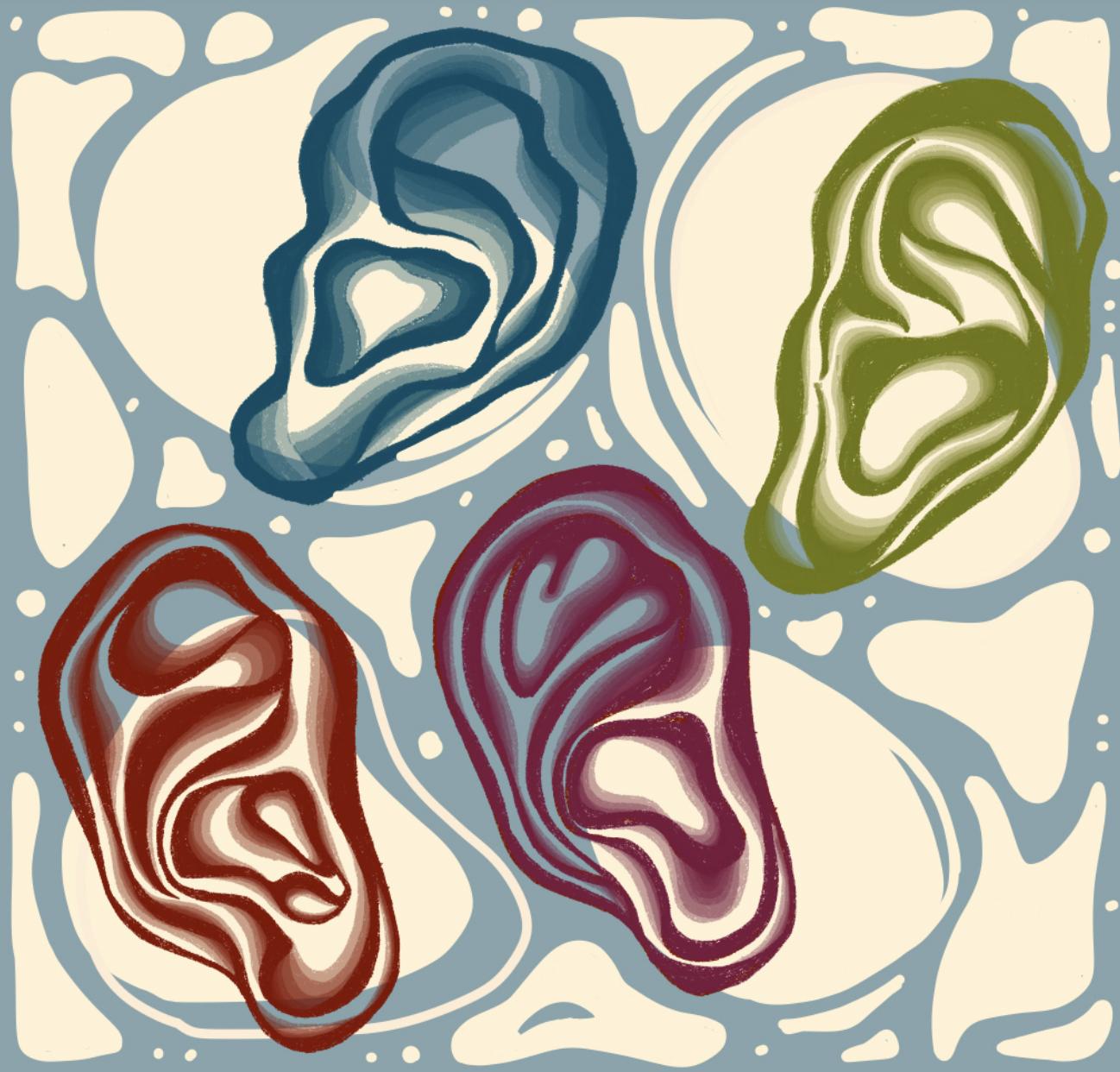

Jet Blue
Nyati Misra ‘23
Takeoff
FromGate58to62, Iwatchedthebustleofrushedand swallowed footsteps.One,two.One, two.Theweddingisin42hours. HalfHindu.HalfMuslim.Big deal.
In free fall.
Momprays: Please Vishnu. Please Vishnu.
PraisebetoCancún. Theplanedidn’tgodown.
Themaninthewindowseat isalone.“Notanline”Mom says.Inoticed.OhVishnu,I noticed.Therearetwo hoodedoriolesflyingneartheplane. Fleetingandflicking.Halfquiet. Halfgone.Theenginetakes one.Liftingherinravenouswinds. Caressingthencutting.Sploshingher vermillionliketinytidepools.Her partnerscampers.
She’slucky.Hoodedorioles don’tmateforlife.Convenient.
Takedown
Iamweightless.Butweare ballistic.Amanandawoman sitacrossfrommyaisleseat. Shewearsaweddingring. He’sonherchest.Anauntie said“you’renext!”tome.Now, I’mmotionsick.Halfmassed. Theweddingisover.Halfmutiny. IwishIwasahoodedoriole.
Sabrinaisthecaptain. Allwomencrew
Women.Women.Women. Momboughtmea rainbow dolphin.Shedidn’tevenask. Didn’tponder. ItoldherthatifImarryat36,shewill be80.“Noissue,”shesays,“you’ll findyourotherhalf.”
Momwillneverask.
PleaseVishnu. Please Sabrina. Bringthisplanedown.

Natalie Garcia ‘23
My little leafy, pink plant stands high and mighty as the sun replenishesher.
“Look at me, Mom! I’m a big kidnow!”
Her vines are straight and tall. She dances to the feeling of the sun’s heat.
But now, the summer rays are gone and limited. She wilts more and more as the sun sets closerto4:30pm. She droops, cries, and sings a dark song. An artificial light supports her. Even though she is a little less wilted with the fluorescent LED light, her leaves still curl. Nothing beats the magic of the warm rays of sunlight. The man in the sky who gleams through the window at night now replaces my plant’s best friend, Mrs. Shine.
Birds travel in unison as darkness prevails at approximately 5 pm. The beautiful black crows show off their sleek bodies, thrusting their large muscles and flapping their wings against the setting sky. Like little kindergarteners on the field during
recess, the flock of birds turns into a clusterastheyturnfromNorthtoEast.
Today is the last 75-degree dayinNovember.
Are they scared for what is to come?
I, too, am scaredforwhatisto come.
The birds know the cold and the wind that will come tomorrow, fleeing from the inevitable. Avoidant like me, the birds kiss goodbye dark Byfield nights, and in a split second, thebirdsaregone.
When it gets too dark, you migrate.
When it gets too dark, I turn onmylamp.
When you need to save your food,youdigitdeepintotheground.
When I need to save myfood, Iputitinmyfridge.
When it gets too cold, you growathickerfurcoat.
When it gets toocold,Iputon myjacket.
When you get bored, you roamthelandandswiminthepond.
When I get bored, I scroll on mytelephone.
I look out of the window as my teacher drones onandon,andIfall intotherhythmofthewindshakingthe trees. Defying gravity, they abruptly rattlefromlefttorightlikedissenting snakes who persist in living in the backyard, despite the numerous attemptstowarnthemby flauntingtheirdeadfriends.
I think about the people who lived before us, andhowtheycutthese precious trees to establish this town, this school, and this classroom. How pretty would this be without this industrialbuilding?
I think of howthebirdswould sing their fee-bee song on thetreetops, how the squirrels would dig with all their might with their little paws to hide their acorns, or how the bees would pollinate the fragile purple flower that may have lived if we had notbeenhere.
The drive to the White Mountains from Northeastern Massachusetts is a brutal one. 2.5 hours, 150 minutes, 9000 seconds of highwaydriving.
The beams of the LED lights blind me. The trees are slate and bare, and the sadness of November prevails.
As my Mom and I get closer to Littleton, the highway becomes one line as the road winds through the valleyofthetwinmountains.
As we drive past the post-foliage leaves on the pavement, the sight of a lifeless deerwithitseyes wide open stares deep into me until it can find my soul. No blood,nobroken extremities,justablankstare.
“Whydidyoudothistome,”I imaginehewouldask.
We speed past the lifeless entity in our metal sphere, as if its existence was just a faint, minuscule, and irrelevant moment in the timeline ofEarth.
Mycatmeowsatmymother,a long, painful noise demanding his shrimppateé.Ithinkofthoselittlepink shrimps submergedinthecreamypaste in that metal jar...wheredidtheycome from?
Mangroves: a wide variety of trees and shrubs that provide low-oxygen soil. Mangroves, by
themselves, provide fish supply, storm protection,andspawningterritory.This translates into a value of $3,375 per acre a year profit for over 5years.The large roots of the trees grow sporadically while it houses barnacles, sponges, worms, crabs, jellyfish, snails, and all different kinds of animals looking for a home. Farmers have converted mangroves into shrimp farmsinThailand.Oncemangrovesare converted for shrimp agriculture, they areonlyusablefor5years.
It would take $2000 in damages per acre to restore. That’s more than half of the profits made without changing mangroves, spent just on reconstructing the damage created.
While my cat sees a little yummy shrimp on his blue plate that makes his tummy rumble, I see the poorfarmerforcedintoadegradingjob position, simply to be able to provide foodforhisfamilyoffive.
The smell of the leaves unleashed as we stepped and crushed their brown, thin bodies. The sound of nothingness prevailed. Bare trees
beside the evergreens are what's left. I wonder where the birds have gone?
Maybe to Mexico or Canada, as they fly ina“V”shape,flappingtheirwings throughthemisty,coldair.
As we walk, the smell of freshly cut grass dissipates in the air. The shy sun hides behind the grey, puffy clouds; little droplets touch my skin. As I walk through the pathinthe forest, I don’t see a squirrel orevenan ant.
Wearealone.
It is just my classmates and me... how unnatural this feels.Thereis something so beautiful about nature, and the crisp air, and the crunchy leaves, and the faint water droplets, and the rough bark on the tree, and light brown leaves that look like hair, and the vine-like plants, and the grey clouds,andthetalltrees.
Wearen’tmeanttobehere.
Driving at night hurts my eyes. The red, yellow, and green rays oflightcluttermyvision.
Buildingafterbuilding.
Car after car. It all seems routine.
Pedestrians cross the street at unexpected times.Withoutthelightsof the car, there is no separation between the pavement and the sky. The car behind me honks, and I switch the radio to Hot 96.9 to distract me from the commotion. My thoughts fade into the brake lights and the chorus of Foolish as I drive down the streets of mycity.
I can hear my steps as I walk withoutintention.
Besides the Littleton diner, where an elderly couple shares an order of cheese curds, there is not much here. The fierce river while the water hits the rocks is the latest hit song on the never-before-heard soundtrack. The sun hides behind the clouds.
Sometimes I wish Icouldhide like the sun. I would hide behind the fluffy clouds, like a ghost. Like a shooting star, Iwouldsuddenlyvanish; my existence would be a minuscule blink in comparison to the lifespan of theEarth.
The twin mountains are best friends.
They went to the first grade together and fought over who was the tallest and had more rocks. Now they are inseparable. They dress in whiteas the winter wind blows the ruffles of theirsleeves.
A shallow riverflowsbetween the twin girls, where raccoons, deer, and bears come home to their lodging. Towering evergreens keep their hue beside the naked trees. The clouds are not tall enough for the girls. They are blanksheetsofpaperthatglidethrough theirheads.
Being in between the two is disorienting, yet there is something so pristine,sofresh,aboutthelandscape.
The air feels heavy when I walk the streets. The aroma of fried chicken from the bodega follows me
two blocks away, back to my house. I feel like I am sharing this air, like someone is sucking and sucking all of the scents away from me into their selfish lungs.Witheverybreath,theair feels dirtier, knowing I am sharing it withpesteringhumanbeingswhoseem to ruin everything. All Iamleftwithis fractions. I huff and puff, but there is notenough.
Call me greedy, but it feels like I have not been left with much of it.
Like a 3-year-old child,Iwant italltomyself.
The air in Littleton is crisp. The sweet hibiscus lingers intheair;if ice and Listerine were a gas, it would be the one I breathe in. I imagine the air molecules are stretching their little armsandfingersanddancingaroundin theirspace.
When I go back home, I think of the air andhowgooditfeelstohave spaceandtofeel free.
No cluster, no people, just mountains, flowers, and crisp air allllllllllltomyself.
“There is a deep interconnect -edness of all life on earth, from the tiniest organisms to the largest ecosystems, and absolutely between each person.”
–BryantMcGillXIII.9:40p.m.
My legs feel like I have been swinging them on a cliff, and they are abouttogiveout.
Like a pestering little insect nibbling at my spine, a sharp, constant pain nags at my back. The frost seeps through my window, reminding me of theprevailingwinter.
My eyesareforcedshutbythe oncoming droopiness. I fade into a distant memory of myself, inmyblack coat, surrounded by nature’s falling feathers of whiteness. I am alone, and it is the first 32-degree morning in November.
The more I snooze, themoreI meltintomychild’sembrace.
Daughter, I cherish the memories of vibrant leaves, healthy soil, thriving vegetation, and blue skies.
The skies are now grey, and I remember to love you a little more whenthistimecomesaround.
I caress her beautiful leaves while hugging her pot. Fromnowon,I speak only kind words and practice gratitude for the liberating and clean air you provide me. For how much we have ruined your natural family, and wiped out your home, like the merciless beings we are, you continue to nurture us. It is time that I nurture you.
Every night, Ispeaktoandpet mydroopyplantuntilshebecomestall, colorful, and vibrant again. She smiles back at me, and I grin back at her. I finallyfeelfree.

Clark Yang ‘25
TomychildhoodfriendAaron: Weusedtodothisthingwherewestolefromtheshopsstreet-side. Wewouldwalkintwodifferentdirectionstryingtostealasmuchaswecould
Ialwaystoldyou:
“Whenwemeetattheendofthestreet, Remember:showmewhatyougot.”
WhileIwentthroughtheshops,findingwaystosneakout, Iknowyouwereontheothersideofthestreetdoingjustthesame. Magically,wealwaysendedupontheothersideatthesametime.
Then,welookthroughwhateachothergot: Candies,chocolatebars,drinks. Thenweburstoutlaughing.
Laughsthatareloud
Comingfromdeepdown,soloud, Eventhecluelessshopkeeperscanhear.
Myfriend,timeisjustlikethosestreetsthatheardourlaughter, Andwhenwemeetagainattheendofit, Remember,showmewhatyougot.
For the Living or the Dead #1
Judy Wang ‘23
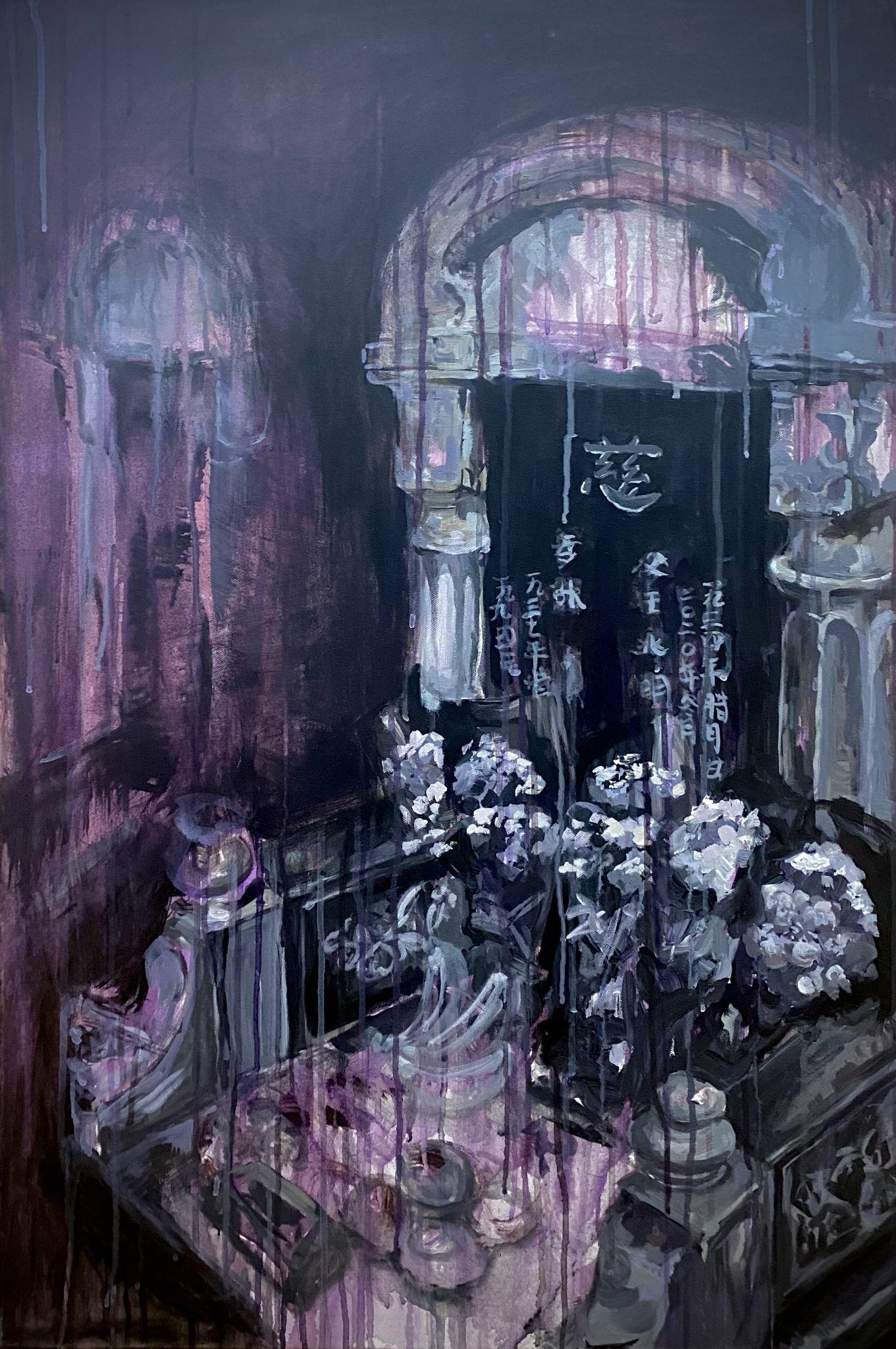
Every visitor of the town agreed that the house on the corner of Poena Street had the most beautiful lawn they’d ever seen. They all wondered how the owners of the brilliant patch of green managed to keepitsovividandlushallyearround. Only the earliest of risers in the town knew of its timid and gentle caretaker–– the lady of the house––who would flit, as faint as a whisper, amongst the soft blades in the early hours of the morning when even the brutalSunhadnotyetawokenfromhis slumber.
One morning,afewyearsago, she did not appear In fact, she would neverappearagain.
Her husband said it was a foreign virus they had picked upwhile traveling in Europe. They had never left the small town. Yet, he must have been telling the truth, the town reasoned, and if the webs of welts and curious finger-shaped bruises like spiders crawling up her arm (scarcely hidden by her long sleeves) seemed vaguely familiar, the residents could
not be sure and they remained convinced the symptoms were like nothing they had ever seen. And when once, a young man, a visitor passing through the town, had tentatively approached them in the streets and asked the lady if she was alright, she flinched and slipped a furtiveglanceat her husband, who roughly grabbed her before she could respond. The town would not see her again.Hercondition has deteriorated so, the husbandwould explain in response to the occasional concerned query, that the slightest leaf rustle rumbled like an earthquake in herears.Itmust’vebeentrue,forevery night, as soon as the silence oftheday was broken by the hoot of an owl or the banshee wail of a coyote, ghastly cries ofpainemanatedfromthatcorner oftheotherwisesilentstreet.
The grass, too, began to fade. At first, the changes were almost imperceptible— a slight patch of fading green here or there— but, gradually, the decay became more pronounced, until all that was left was a yellowish-brown patch of stubble
like anautumncornfielddenudedofits verdant,silkybounty.
One night, the screams stopped.Thenextdaythetownsawthe man in the hardware store, purchasing a largeshovel.Thestrangequietnessof last night was still on the town’s mind when they asked the man, had something happened, was everything alright, and all of those questions people pose when they know already that something had happened and that everything is terribly, horribly wrong. Through tearless sobs, he told them that, after years ofunflaggingstruggle, the Reaperhadfinallyclaimedhiswife asHisown.
Eventually, his words became truth, diffusing through the dry air in murmurs and whispers, rustling the yellowing blades of grass. No one questionedagain.
And when, a few weeks later, all but a bare patch of recently upturned soil in themiddleofthegrass started to grow green again, the town said not a word. Indeed, they had forgotten the time the lawn on the corner of Poena Street had becomethe same wilted brown as all the others around it. No, no, that house had an
ethereal evergreen lawn: therefore, it alwayshadanetherealevergreenlawn.
One day a small child, still unfamiliar with the ways of the town, stumbled too close to the house. Her ring finger brushed against two of the crisp blades and she cried out, watching with round watery eyes as a drop of blood fell into the soil. Her mother came running and scooped her up, rushing her far away from Poena Street. No one would notice theblades of grass growing from the patch ofred soilstretchhalfafoottaller.
Later that night, under the bright gleam of the silvery Moon,they grew even taller–– firsttotheheightof a dog, then that of a man, then tall enough to swallow the house completely. Likevines,theirserpentine cousins, the blades snaked into the house through crevices around the doors and windows, winding through the rooms. As thin and soft as a lady's fingers, they reached andreached,asif drawn to something deep inside the house. They reached up the stairs and into the master bedroom where, pausing for a few seconds to stroke a belovednecklace,finally,theystopped. They had reached the foot of the large
oak bed where the man lay in imperturbableoblivion.
The next day, the town would not see the man. In fact, they would neverseehimagain.
And as for the grass? It was the same wilted brown as all the other lawns around it–– it had always been the same wilted brown. It had never been otherwise, the town agreed. Occasionally, a visitor passing by would notice the faint streaks of green running up the clapboard sides of the
house, but the question would fade before it could form on their tongues and they would turn the corner and soon forget the house on the corner of PoenaStreet.
*Poena is the spirit of punishment and the attendant of punishment to Nemesis, the goddess of divine retribution, in Greek mythology

Sahiba Mohammady ’24
WhoamI?
Ihavestartedmynewdaysfinishinghighschool.
Ihaveadreamforahouse;Ihavefriendstojokewith. Ihavepeopletospeakto;Ihaveafuturetoworkfor. Ihaveahometogoto;Ihaveacountrytobuild.
Ihavealifemuchpreparedformydestiny, Butasecondstartstochangeanhour, Anhourchangesthemoments.
Amomentchangedmy“have”to“had”. Amomentisaremarkablememory; Andamemoryisalife.
IamwhoIam.
Iamfromsomewheretonowhere. Iamfromnowheretoeverywhere.
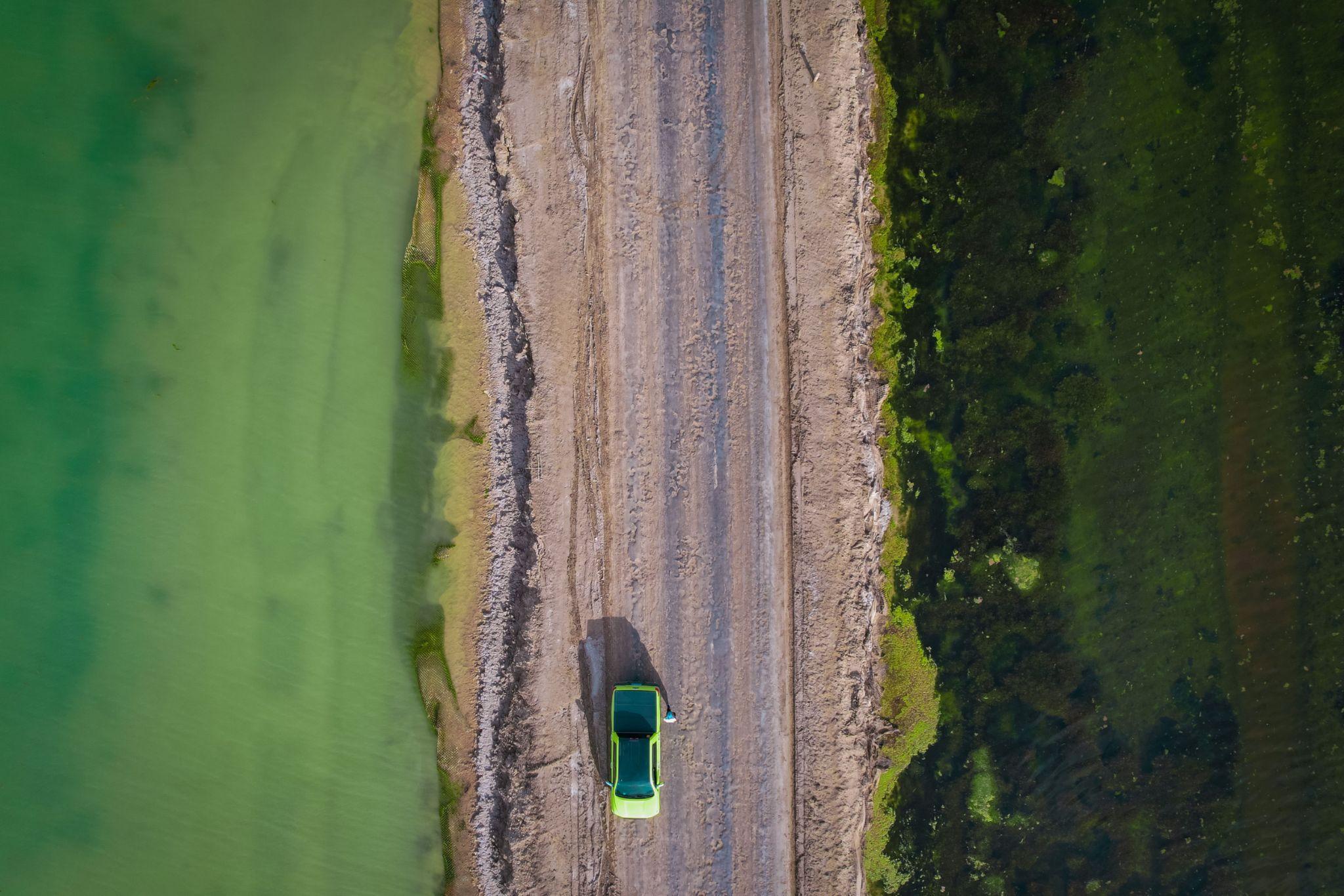 Green Binary Leo Liu ‘25
Green Binary Leo Liu ‘25
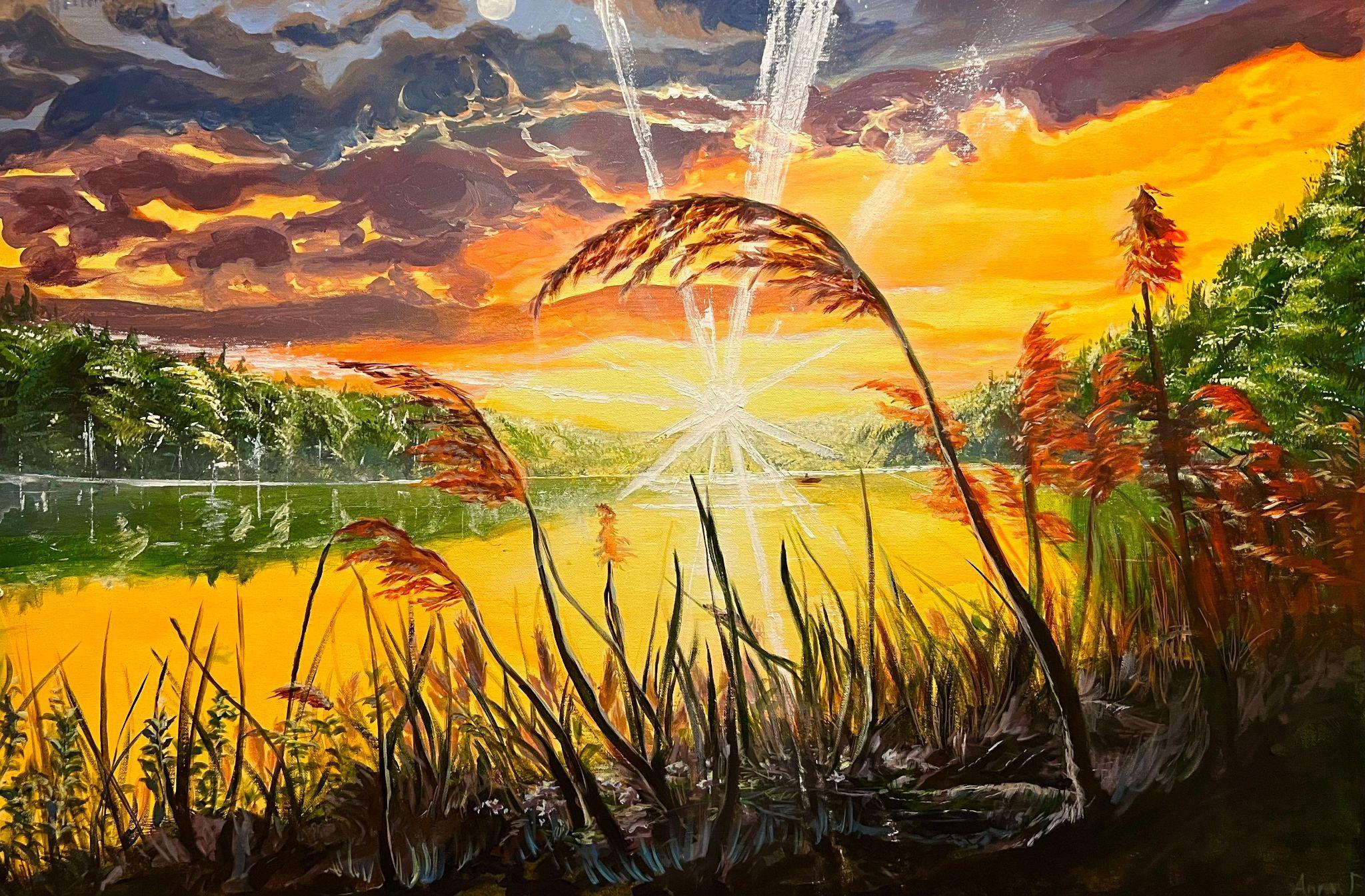 Untitled Anna Feng ‘24
Untitled Anna Feng ‘24
Milo Chaudry ‘26
Theoldleatherwatchyouwore, Sittingonyourhospitaltraytable, Grandmaboughtitforyouwhenyougotyourfirstjob. Howmanymorestaggeredsecondstillyourunout?

I’llputyoudown,I’llletyougo,yourwristshavegottentoofatanyways,you can’twearitanymore, I’llwatchyouexpire. Still
Don Xing ‘24
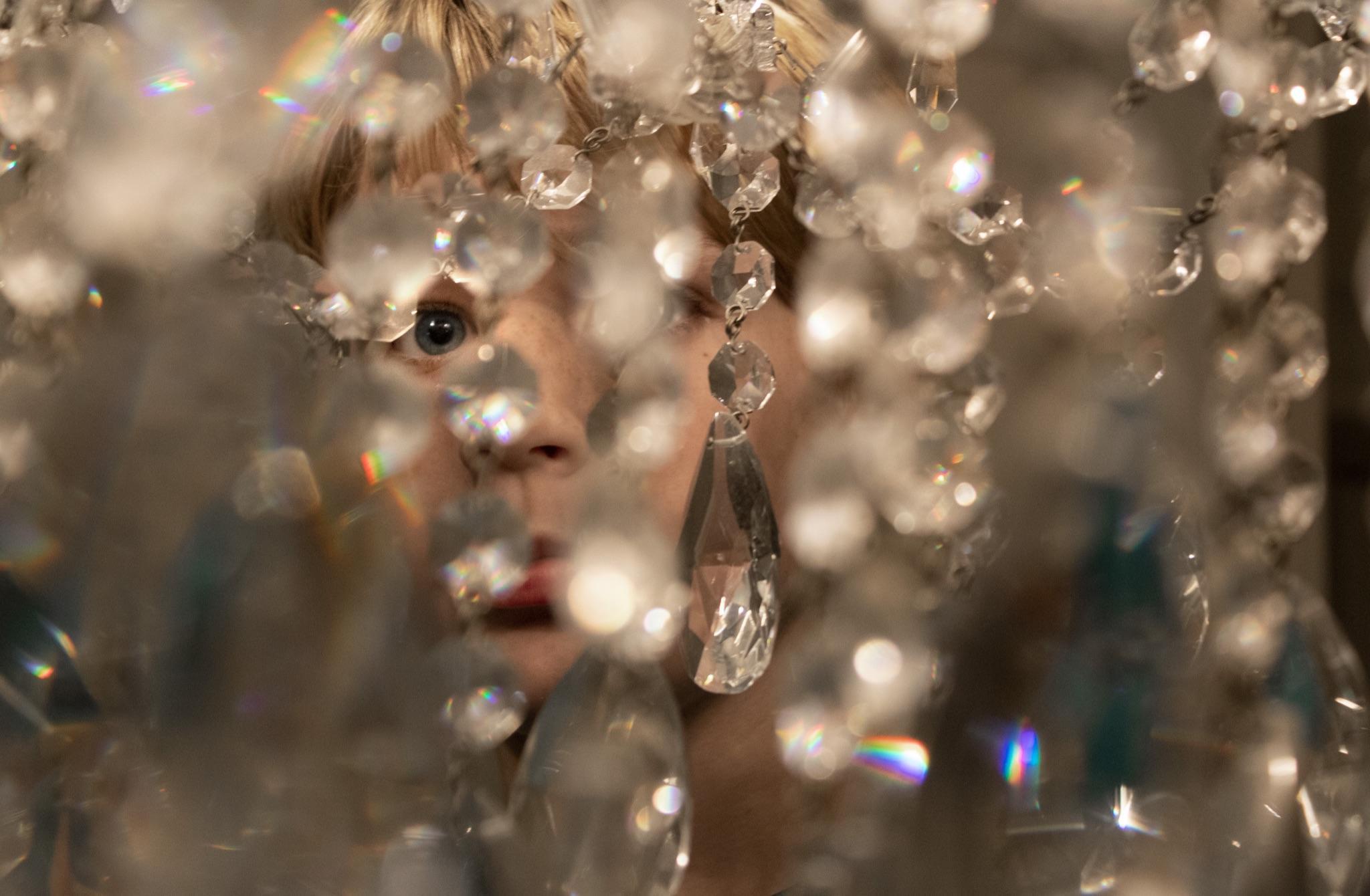 Beholder
Lilly Baumfield ‘23
Beholder
Lilly Baumfield ‘23
Jovana Moy ‘26
Mytherapisttoldmeduringmysessionthatrecoveryisan“uphillbattle”, Istaredathim, Thinkingtomyselfhowthiswasuphill.
Andifanything,itwasdownhillandIwasgoing90mphdownit, Spiralingandspinning, OutofcontroltowhereIhadnopowerovermyself.
I’mrunningdownahill
AndIcan’tstoptheforcepushingmeforward, LikeagustofwindbehindtellingmeIneedtokeepgoing, Keepfighting.
But,battlesaren’tuphill, FromwhatIrememberfromhistoryclassinmiddleschool, Theydon’tfightuphilleither.
TheCivilWarwasn’tfoughtonahill, NorwasLexingtonandConcord,YorktownorSaratoga, And,ifIremembercorrectly,thesoldiersfoughtonflatland Wheretherewasn’tahillinsight.
WhataboutBunkerHill?
Thebattlewasfoughtonahill, Wherestruggleandwarwerehandinhand
IthoughtaboutthehillthatI’veknownsodear, Thehillmyhousewason.
Allofmymomentsofpeaceandwarwereonthathill,
Tothecallousesonmyhand, Frommydadteachingmehowtothrowabaseball,
Andthesummerpicnicswithmybrother, Thatweresopeacefulwiththesummer’swind Glidingthroughtheneighborhood.
Warsdon’thavepeace. HowcouldIpossiblyfightupthishillwithpeace?
Thatsnappedmebacktothesession, Whilehekeepsrantingonandonabouthealthyhabits, ButI’mthinkingabouthowIcanwalkdownthehillpeacefully.
 Allegory
Gabrielle Maher ‘25
Allegory
Gabrielle Maher ‘25
